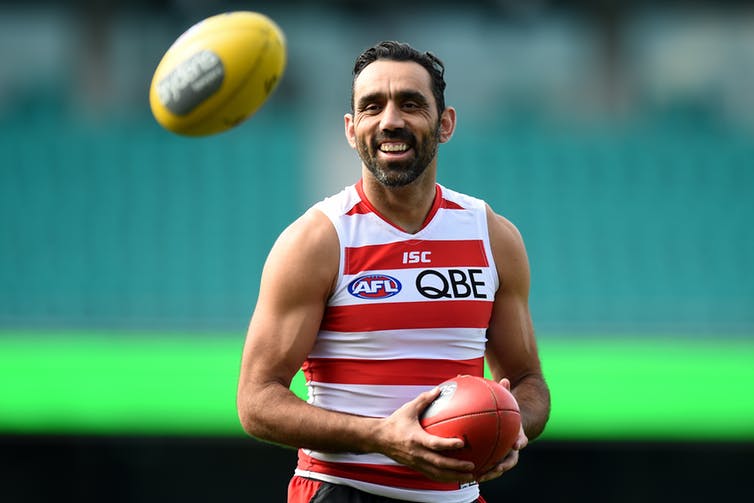The Adam Goodes documentary ‘The Final Quarter’ generated a public conversation filled with plenty of contemplation and hindsight after it premiered on national television on Thursday night.
The film revisits the last three seasons of Goodes’ 372-game career, chronicling the racism and bullying which ultimately forced the Sydney Swans star into an early retirement.
Indigenous affairs advisor for Media Diversity Australia, Shannan Dodson said although the film was hard to watch, the important story needed to be told.
“The first time I watched it, I bawled my eyes out,” Ms Dodson said.
“It was a real punch to the guts. It was really devastating to watch the gravity of that situation, what Adam went through, and I really feel like we let him down.
“He was carrying the weight of the history of trauma and guilt and everything in this country that we are so uncomfortable to talk about - he carried the brunt of that.” Ms Dodson, a Yawuru woman, said she believed that Australian society wasn't “mature enough at the time to have a really open robust conversation” about racism.
Ms Dodson, a Yawuru woman, said she believed that Australian society wasn't “mature enough at the time to have a really open robust conversation” about racism.

Adam Goodes does a war dance. Source: Supplied
“I hope that this film helps people to have a bit of introspection, to think that what happened was hurtful ... [Goodes] was bullied out of his workplace, which is unacceptable by any means,” Ms Dodson said.
“The fact that it had racist connotations attached to it is a whole other level of hurt and trauma that we really need to come to terms with as a country if we want to move forward.
“We need to work actively as a country to understand where Indigenous people are coming from, to understand where that hurt and trauma has come from - so that we can start seeing each other and work on common ground.”
The Final Quarter also centred an Indigenous voice in a wave of response on Twitter.
Ms Dodson said the lack of Indigenous voices to speak out about the jeering of Goodes at the time was a real issue.
“With any type of conflict, the person that is hurting is the one that needs to be heard," she said.
“I think a lot of Indigenous people felt that there just weren’t those voices to express why it was such a big issue ... There was a lot of non-Indigenous commentary about why it wasn’t hurtful when it’s really not up to someone else to decide when they’ve hurt someone.”
Aboriginal Postdoctoral Research fellow at the University of Wollongong, Dr Marlene Longbottom said she also felt a barrage of emotion while watching The Final Quarter.
“Being an Aboriginal person in society you tend to deal with this on a day to day basis and I was proud of him for standing up and doing what’s right by our people," Ms Longbottom told NITV News.
“Bringing out his voice and his experiences, [he] shared that trauma in a positive way that can benefit the whole country.” Ms Longbottom said she remained disappointed by the lack of an Aboriginal voice in the media, although the Adam Goodes documentary symbolises a "step in the right direction".
Ms Longbottom said she remained disappointed by the lack of an Aboriginal voice in the media, although the Adam Goodes documentary symbolises a "step in the right direction".

Adam Goodes, former AFL star for the Sydney Swans was booed for weeks after he performed a war dance directed at opposition fans. Source: Dan Himbrechts/AAP
“The dominant culture holds a position of power in this country and having people who are there to present a Western narrative that is dismissive of Aboriginal people’s experiences, and in particular Adam Goodes, it actually normalises that language,” she said.
“People become socially conditioned to hearing that narrative and when you become socially conditioned you accept the status quo as the truth.
“The media had a platform that could have assisted Adam Goodes’ message … It really didn’t do Adam Goodes justice.”



